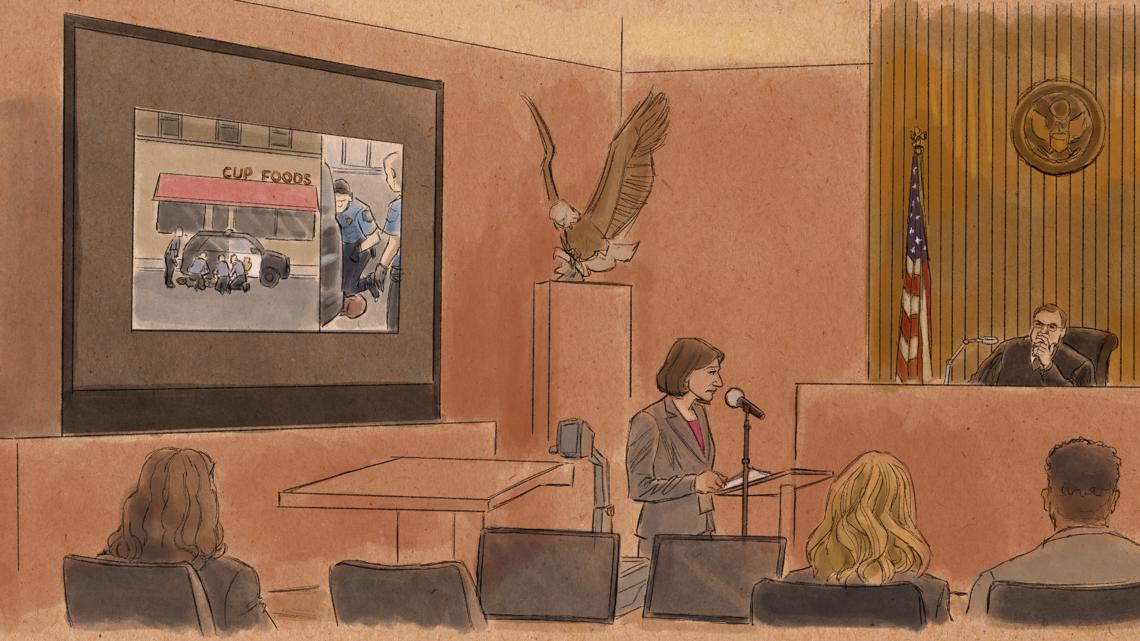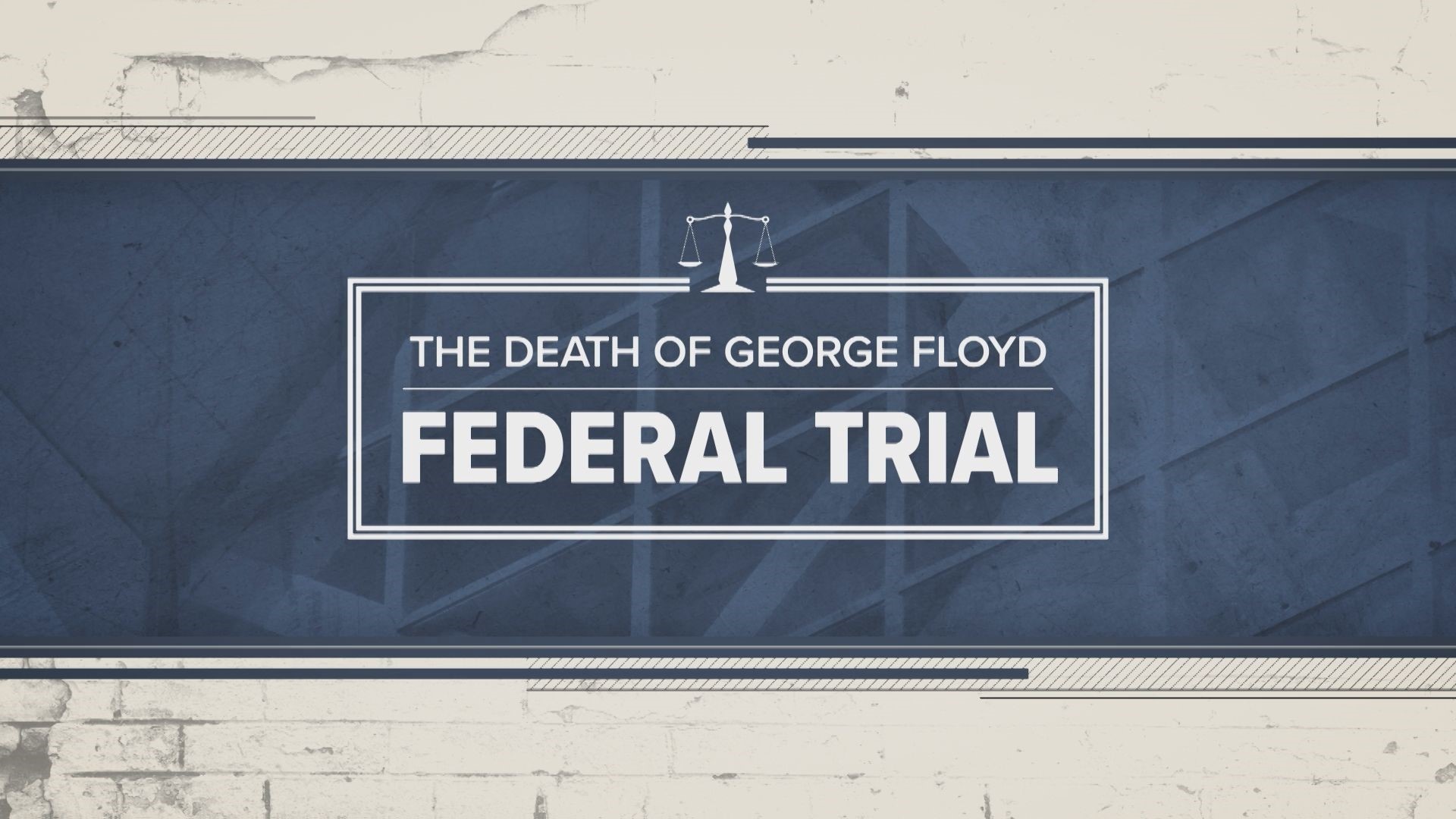ST PAUL, Minn. — Monday marked the start of the federal trial of former Minneapolis police officers J. Alexander Kueng, Thomas Lane and Tou Thao, each charged with violating George Floyd's civil rights on the day he was murdered in May 2020.
All three are charged with failing to provide Floyd with medical care as fellow officer Derek Chauvin knelt on Floyd's neck for more than nine minutes. Thao and Kueng face an additional count for failing to stop Chauvin, who was convicted of murder and manslaughter in state court last year.
Chauvin pleaded guilty to the federal charges in December 2021.
Monday's trial began with Assistant U.S. Attorney Samantha Trepel presenting the infamous shot taken from a security camera across the street, showing jurors where each of the defendants were in relation to Derek Chauvin, and how they had the ability to step in and stop what she called "a slow-motion death," but did not.
"For second after second, minute after minute, these three, CPR-trained defendants, stood or knelt next to officer Chauvin as he slowly killed George Floyd right in front of them," she said, adding, "They chose not to protect George Floyd — the man they had handcuffed and placed in their custody."
Attorneys for the defendants — Thao, Lane and Kueng — told jurors they need to look at what led up to the infamous video so many have seen. They placed the blame on Derek Chauvin, inexperience and a lack of proper training provided by Minneapolis police, saying their clients did not willfully deprive Floyd of his civil rights.
Following opening statements, the prosecution called its first witness, FBI audio and video evidence expert Kimberly Meline. Prosecutor Allen Slaughter showed Meline video footage from the day George Floyd was killed, including from inside and outside Cup Foods, video surveillance footage from other area businesses, bystander recordings and police body camera video. Meline told the court she worked to synchronize the footage, explaining how it could help to determine what happened that day.
Meline was questioned for more than an hour over the video footage, ultimately ending her testimony for the day just before 5 p.m.
Shortly after court adjourned, members of Floyd's family gathered to speak to reporters outside the courthouse.
Court is scheduled to resume Tuesday at 9:30 a.m.
5 p.m.
Members of the Floyd family spoke outside the courthouse following the first day of trial. Watch:
4:45 p.m.
Following opening statements, the prosecution called its first witness, FBI video and audio evidence expert Kimberly Meline.
Meline told the courtroom that before joining the FBI, she worked as a forensic scientist for both the St. Cloud and St. Paul Police Departments.
Prosecutor Allen Slaughter showed Meline video footage from the day George Floyd was killed, including from inside and outside Cup Foods, video surveillance footage from other area businesses, bystander recordings and police body camera video. Meline told the court she worked to synchronize the footage, explaining how it could help to determine what happened that day.
Prosecutors then showed video from Lane's body camera, beginning with the former officer driving to the scene. The video goes on to show the officers' full interaction with Floyd, including the point where the officers had Floyd out on the sidewalk, underneath Derek Chauvin's knee. Lane can be heard asking Chauvin if they should roll Floyd onto his side, to which Chauvin replies no. Lane can then be heard saying, "Yes, boss." The video eventually shows Lane assisting EMTs in the ambulance by performing CPR.
Following Meline's over-one-hour-long testimony, the judge dismissed the jury just before 5 p.m.
Court will resume at 9:30 a.m. Tuesday.


2:45 p.m.
The final defense attorney to issue an opening statement was Earl Gray, the lawyer for Thomas Lane.
Gray's statements most directly pointed fingers at Derek Chauvin, according to KARE 11 reporter Karla Hult, who's been following the trial on Monday.
During his remarks, Gray said Lane suggested "hobbling" George Floyd, or rolling him into his side, and said Lane told Chauvin that Floyd was "staying where he's at."
Gray confirmed Lane, who he described to the jury as a "gentle giant" and expecting his first child, will testify during the trial.
12:30 p.m.
In his opening remarks, J. Alexander Kueng's attorney, Thomas Plunkett, told the jury that Kueng was a rookie officer who might've felt intimated by the Minneapolis Police Department's dynamics.
He reviewed the backgrounds of all the officers at the scene, including Derek Chauvin, who was the most senior officer in the group and had 19 years of experience on the force.
Plunkett implored the jury use "common sense" in their decision for Kueng when deciding if he acted with bad purpose and specifically intended to "deprive Mr. Floyd of his rights."
12 p.m.
After a short break following the prosecution's opening statements, defense attorney Robert Paule issued opening statements on behalf of his client Tou Thao.
Thao is also being represented by Natalie Paule. Thomas Lane is represented by Earl Gray, who most recently represented Kim Potter during her manslaughter trial, and J. Alexander Kueng is represented by Thomas Plunkett.
Paule began his remarks by "acknowledging the tragedy" of George Floyd's death before reviewing the timeline of his arrest and said the video taken by bystander Darnella Frazier doesn't show the full picture of what happened that day.
Paule concluded by asking the jury for a "Not Guilty" verdict for Thao, saying, "The events that occurred that day are indeed a tragedy... does not mean that the actions of Mr. Thao are criminal."
11 a.m.
The trial began just after 10 a.m. when Judge Paul Magnuson reviewed the charges, procedure and pandemic protocol with the jury.
Prosecutor Samantha Trepel issued opening statements first and spoke to the jury about the three officers' lack of action while Floyd struggled to breathe under Chauvin's knee.
Trepel also outlined several points of the prosecution's strategy during the trial, which will include sharing videos with the courtroom and witness accounts, and concluded their opening statements after about an hour.
According to KARE 11 reporter Lauren Leamanczyk, who was inside the courtroom Monday as the pool reporter, Lane and Kueng were looking down and writing during much of the prosecution's opening statement, while Thao looked straight ahead at Trepel.
Attorneys for the defendants called for a mistrial following the prosecution's opening remarks, calling them "overly argumentative." Judge Magnuson agreed that the opening statement was more argumentative than the court is used to, but wasn't grounds for a mistrial.
Cameras are not allowed into the courtroom in this trial.
Pre-trial recap
On Thursday, the first and only day of jury selection, 12 jurors and six alternates were seated. The jury includes people from across the state, instead of just residents of Hennepin County, like those who sat the jury for Chauvin's state trial. Of the 12 jurors, seven are women and five are men. Of the alternates, three are men and three are women.
"It's going to be a much, much tougher case," said Dan Scott of Kelley, Wolter & Scott. Scott spent most of his career as either a federal prosecutor or a federal public defender in the District of Minnesota.
Mark Osler, a former federal prosecutor and professor at the University of St. Thomas School of Law, told the Associated Press, "In the state case, they're charged with what they did. That they aided and abetted Chauvin in some way. In the federal case, they're charged with what they didn't do — and that's an important distinction. It's a different kind of accountability."
Judge Paul Magnuson told the jury the trial could take about four weeks, but Scott said depending on how tightly Magnuson controls the hours in the courtroom, he expects it could wrap up in two.

